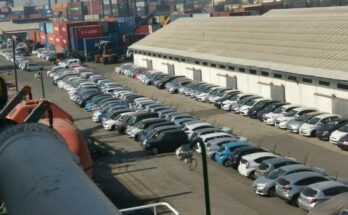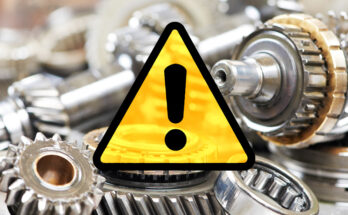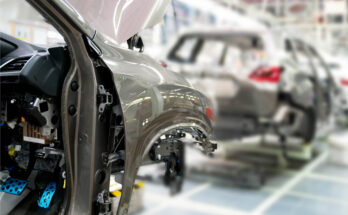We often discuss how the local assemblers are negatively impacted by the market slowdown and deteriorating sales trend. The difficult and very different side of the story is how the small auto part manufacturers are handling the pressure.
Recently, Dawn published an article on their visit to a few auto parts manufacturers in Karachi to learn more about how they are handling the current issue. The way these SMEs are operating is very concerning.
One would expect to hear the clamor of spinning gear and the hammering of metalworkers when approaching an auto vendor’s unit in North Karachi. But here, the assembly line is almost completely dark, with the exception of a few lights that have been left on to aid in navigating the complex machinery. This is Half Man — which makes sheet metal parts for Pak Suzuki and Lucky Motors — the production lines here are silent and workers are conspicuous by their absence. Half Man Chief Executive Mohammad Shakir says his plant is currently operating at 25% capacity. He said:
“We keep the lights off on inactive production lines to offset the overhead expenses, such as unbearable power bills. We have reduced our workforce to 28 skilled hands, down from around 100 some two years ago, by removing contractual and daily wagers since orders from assemblers are dwindling.”
He recalled that his setup used to consume 90,000 kg of steel sheets every month for production purposes, but last month, no purchases were made. Autopart manufacturers are also apprehensive as a result of the dramatic decline in auto sales; they remain divided over whether to shut down their facilities or endure in this challenging environment and wait for things to get better. Mr. Shakir is among those looking for some improvement in the political climate, which would spur the economy back to life.
According to Syed Asad Ali Naqvi of Indus Engineering, they have retained only 30 of their 100 employees, with production down to a mere 10% of what it used to be two years ago. He said:
“We cannot offload the rest of the skilled and talented workforce, who have been part of the company for decades. We are even finding it hard to pay salaries, despite the low strength of workers.”
However, Mr. Naqvi said despite the drastic reduction in production, their monthly electricity cost is approximately Rs200,000–225,000 as opposed to the Rs400,000–450,000 they used to pay during the period of peak production about two years ago. Plus the exorbitant transportation charges which have tripled in this same period, have made things even worse.
Another auto part exporter from the Korangi Creek region, Mashood Ali Khan, claimed that small- and medium-sized auto vendors were working at 10 to 35% of capacity as a result of dwindling orders from local assemblers. Many of those who obtained millions in bank financing three years ago in the hope of increasing sales to buy high-tech imported machinery are now faced with expensive financing because of rising interest rates, plant closures, and declining sales as a result of rising (car) prices.
Related: Despite Strengthening Rupee, Assemblers Refuse to Cut Down Prices
Mr. Khan said because of the high KIBOR rates, vendors who had taken out loans for financing imported machinery are now having trouble making their monthly payments. Government assistance is required for small and medium-sized businesses, and our skyrocketing power costs should be covered by the power sector. According to him, Wapda and K Electric can also assist by lowering power tariffs for SMEs in a similar manner to how the government has done so for customers using fewer than 200 to 300 units.
Galaxy Polymer Engineering makes plastic parts and lamps for Pak Suzuki, Ghandhara Industries Limited, Isuzu, Master Changan, and Hinopak at their set-up in the SITE Area. However, their director, Abdul Rahman, is not overly alarmed because he diversified his company’s operations four years ago, producing various parts for businesses other than automakers and probing the export of plastic goods.
He claimed that in order to keep up with the manufacture of automobiles, his company installed five to six injection molding machines, totaling Rs 16 million in investment during the previous four years. But now that vehicle production has drastically decreased, even he can feel the pinch. He added that the cost of doing business was only going up, and they were trying to survive on low profits. Abdul Rahman said:
“Two years ago, we had 55 employees. Now, we have 42/43, despite the fact that only 35% of the output of my factory is auto parts. We are running only two machines at night instead of a fully functional second shift to stave off unbearable power bills.”
According to Aslam Feroz of Feroz Industries, he was only left with 26/27 trained workers out of the 62-strong workforce he employed only two years ago. As a result, production at his sheet metal parts factory in Jahangirabad is also down to a mere 20%. He said:
“We have also cut power to non-operational production lines to reduce power costs.”
Aslam also revealed that many vendors are selling their old assets, such as real estate, to maintain their operations and manage employees’ salaries.
Source: Dawn

A computer animation professional with over 23 years of industry experience having served in leading organizations, TV channels & production facilities in Pakistan. An avid car enthusiast and petrolhead with an affection to deliver quality content to help shape opinions. Formerly written for PakWheels as well as major publications including Dawn. Founder of CarSpiritPK.com




